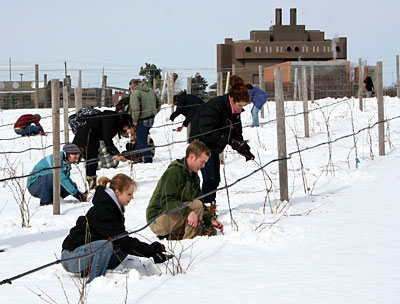Sustainable sipping: New York produces eco-friendly wines
By Amanda Garris

On some New York wines, along with such traits as fruity and bold, could soon be "with hints of sustainable pest management and soil conservation." Such sustainably produced wine may soon be appearing on a wine list near you.
For Alice Wise, grape specialist with Cornell Cooperative Extension of Suffolk County on Long Island, sustainability encompasses environmental, economical and socially responsible practices. It can take many forms: a cover crop suppressing weeds in the vineyard; a new hybrid grape variety that has natural resistance to disease; or a flow meter on an irrigation line.
The movement has been gaining momentum, with growing interest from industry and undergraduates. Cornell was the first university to offer a course on sustainably produced wine, when it offered Sustainability and Organic Grape and Wine Production last year. Students in the two-semester class designed and planted an organic vineyard at the Cornell Orchards in the spring, then produced wines from the grapes in the fall. They also learned about water management and wastewater treatment in the winery, as well as sustainable packaging and product distribution.
Sustainable practices were first formalized in 2007 in the New York Guide to Sustainable Viticulture Practices Grower Self-assessment Workbook, which distills sustainability into 134 questions about a range of vineyard production practices.
"The workbook gives growers a chance to look at their whole production system," explained contributor Tim Martinson, Cornell statewide viticulture extension educator. "Sustainability is really the net result of hundreds of decisions that growers make about their growing practices, including pruning, irrigation and soil conservation."
One of the biggest challenges is fending off other organisms eager to live off of grapes -- from microscopic viruses to migrating birds. But sustainable growers need more than nets and sprays, says Tim Weigle, New York state grape integrated pest management specialist.
"Sustainable vineyard management means collecting and managing information, whether it is scouting for pests, using predictive models to time their sprays or meticulously tracking production costs," Weigle said.
With funding from the New York Farm Viability Institute, some growers hope to use the workbook to establish a certified sustainability program that would put good practices right on the bottle. Led by Peter Martini, vineyard manager of Martini Vineyards Inc., the group is recruiting growers from Long Island to Lake Erie to earn the new "VineBalance: Sustainably Grown" label for their wines.
"A sustainable label won't necessarily bring in any more money for the wine, although it may gain the wine entrance into markets where it is valued," Martini said. "Ultimately you do it because it is important to you as a grower -- to be profitable and environmentally responsible."
Some sustainable practices can, in fact, increase a grower's costs. For example, removing shoots and leaves near grape clusters by hand can reduce the need for fungicides, but this requires manual labor.
Todd Schmit, assistant professor of applied economics and management, has found that consumers are willing to pay only a small premium for sustainable wine and that, ultimately, the taste of the wine trumps the growing methods.
Amanda Garris is a freelance writer in Geneva, N.Y.
Media Contact
Get Cornell news delivered right to your inbox.
Subscribe